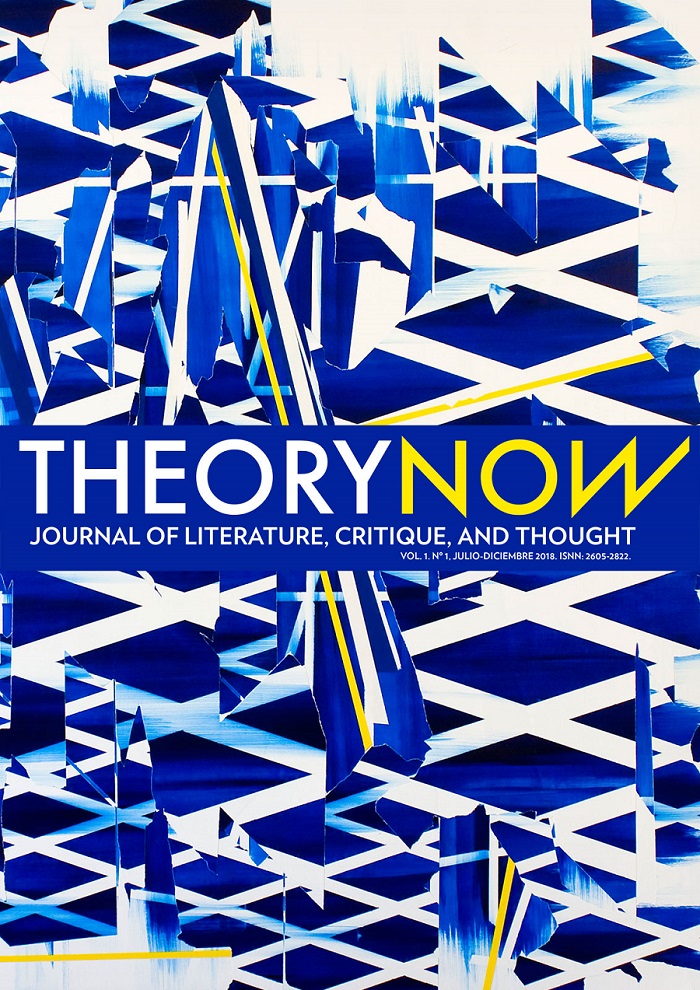Secretos, mentiras e intranscendencia. La producción de causalidad y autodeconstrucción en La noche de los niños, de Toni Morrison.
DOI:
https://doi.org/10.30827/tnj.v1i1.7599Palabras clave:
No-acontecimiento, Causalidad, Revelación, Secretismo, Confesión, Trauma, DeconstrucciónResumen
El presente trabajo presenta una lectura de La noche de los niños (2015), última novela de Toni Morrison, desde la contribución de Jonathan Culler en The Pursuit of Signs and Structuralist Poetics a la narratología, atendiendo esencialmente a tres aspectos vinculados entre sí: la producción textual de la causalidad, el papel de los acontecimientos y lo acontecimental en la narrativa, así como la naturaleza auto deconstructiva de ciertos textos. La novela de Morrison está articulada como una audaz reelaboración de las estructuras narrativas estructurada en torno a la reconstrucción de un acontecimiento primigenio de la trama que solamente se insinúa a través de la analepsis en el presente diegético mediante el cuestionamiento de las relaciones naturalizadas de causa-efecto entre los acontecimientos de la secuencia temporal de la novela. La relevancia de la estructura utilizada por Morrison en La noche de los niños puede apreciarse a la luz de los debates que se han venido produciendo en el ámbito de la narratología sobre la definición de la narratividad en términos de secuencialidad, acontecimentalidad y causalidad, así como la deconstrucción llevada a cabo por la teoría postestructuralista sobre la narrativa. Por último, este trabajo aspira a señalar el momento de autodeconstrucción de la novela, revelado ante la problemática comprensión de que el acontecimiento primigenio de la trama es, en realidad, un no-acontecimiento, algo que aparentemente nunca sucedió.Descargas
Citas
Austin, John L. How to Do Things with Words. Harvard UP, 1962.
Brooks, Peter. Reading for the Plot. Design and Intention in Narrative. Harvard UP, 1992.
Culler, Jonathan. Structuralist Poetics: Structuralism, Linguistics, and the Study of Literature. Routledge, 1975.
____. The Pursuit of Signs. Semiotics, Literature, Deconstruction. Cornell UP, 2002.
____. On Deconstruction: Theory and Criticism After Structuralism. Cornell UP, 2007.
____. “Derrida and the Singularity of Literature”. Cardozo Law Review, vol. 27, no. 2, 2005, pp. 869-875.
Currie, Mark. About Time: Narrative, Fiction and the Philosophy of Time. U of Edinburgh P, 2007.
Derrida, Jacques. Given Time. I. Counterfeit Money, translated by Peggy Kamuf, Chicago UP, 1992.
____. “Passions: Am Oblique Offering”, in On the Name, Thomas Dutoit (ed.), Stanford UP, 1995.
Fludernik, Monika. “Natural narratology and cognitive parameters”. Narrative Theory and the Cognitive Sciences, David Herman (ed.), CSLI Publications, 2003, pp. 243-267.
Hühn, Peter. “Functions and Forms of Eventfulness in Narrative Fiction”. Theorizing Narrativity, John Pier and José Ángel García Landa (eds.), De Gruyter, 2008.
____. Eventfulness in British Fiction: Historical, Cultural and Social Aspects of the Tellability of Stories. De Gruyter, 2010.
____. “The Eventfulness of Non-Events in Modernist Poetry: T. S. Eliot’s ‘The Waste Land’ and Bertolt Brecht’s ‘Vom armen B. B.’” Frontiers of Narrative Studies vol. 3, no. 2, 2017, pp. 319-335.
LaCapra, Dominick. History and Criticism. Cornell UP, 1987.
Leys, Ruth. Trauma: A Genealogy. U of Chicago P, 2010.
Miller, J. Hillis. Ariadne’s Thread: Story Lines. Yale UP, 1992.
____. Speech Acts in Literature. Stanford UP, 2001.
____. “Derrida and Literature”. Jacques Derrida and the Humanities, Tom Cohen (ed.), Cambridge UP, 2002, pp. 58-81.
Morrison, Toni. God Help the Child. Vintage, 2015.
Prince, Gerald. “The Disnarrated”. Style, vol. 22, no. 1, 1988, pp. 1-8.
Schmid, Wolf. “Narrativity and Eventfulness”. What Is Narratology? Questions and Answers Regarding the Status of a Theory, Tom Kindt and Hans-Harald Müller (eds.), De Gruyter, 2003.
Warhol, Robyn. “Neonarrative; or, How to Render the Unnarratable in Realist Fiction and Contemporary Film”. A Companion to Narrative Theory, James Phelan and Peter J. Rabinowitz (eds.), Blackwell, 2008, pp. 220-231.
Descargas
Publicado
Cómo citar
Número
Sección
Licencia
Theory Now Journal of Literature, Critique, and Thought es una publicación de acceso abierto e inmediato totalmente gratuita, tanto para lectorxs como para autorxs. Lxs autorxs no pagan ningún tipo de tasa por el proceso editorial de sus artículos. Permitimos la lectura, descarga, copia, distribución, impresión, búsqueda, enlace o reutilización con fines no comerciales de todos los trabajos publicados, siempre que se citen la autoría, la revista y el órgano editor. Todo material intelectual publicado en esta revista se encuentra protegido con una licencia de Creative Commons Reconocimiento-NoComercial .
Recomendamos encarecidamente la difusión de los artículos en redes sociales (Facebook, Twitter, LinkedIn, etc.) y científicas (ResearchGate, Academia.edu, etc.), repositorios institucionales universitarios y otros repositorios públicos, blogs y webs personales o institucionales, Google Scholar, ORCID, ResearchID, ScopusID, etc. En cualquier caso, la propiedad intelectual de los artículos y los posibles derechos económicos derivados de ellos son exclusivamente de sus autores.













